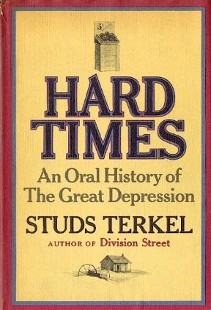 First edition | |
| Author | Studs Terkel |
|---|---|
| Language | English |
| Subject | Great Depression |
| Publisher | Pantheon Books |
Publication date | 1970 |
| Publication place | United States |
| Media type | |
| Pages | 480 |
| ISBN | 978-1-56584-656-2 |
Hard Times: An Oral History of the Great Depression (original: 1970/ latest edition: 2005) is a telling of the oral history of the Great Depression written by Studs Terkel. It is a firsthand account of people of varying socio-economic status who lived in the United States during the Great Depression.
Contents
- Chapters
- Book One
- Book Two
- Book Three
- Book Four
- Book Five
- Epilogue
- Literary significance and reception
- References
- External links
The first edition of the book was published in 1970. The 1986 print included a new introduction by Terkel. The latest edition was published in 2005.